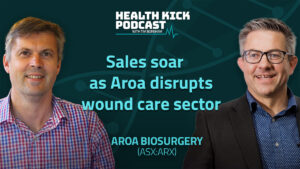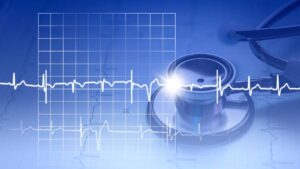Aroa looks to capitalise on growing US wound care market

Aroa is targeting growth in the US wound-care market. Pic: Getty Images
- Aroa looks to capitalise on growing US wound-care market forecast to reach US$13 billion by 2034
- Company is continuing to expand clinical evidence supporting efficacy of its ECM products
- Growing prevalence of chronic conditions like diabetes driving demand for wound-care solutions in US
Special Report: Aroa Biosurgery is confident the company is well placed to capitalise on the massive opportunity that exists within the ever-growing US wound-care market as it continues to advance clinical evidence supporting efficacy of its extracellular matrix (ECM) products.
Soft-tissue repair company Aroa Biosurgery (ASX:ARX) is looking for US expansion with the wound-care market in the world’s largest healthcare market forecast to grow at a CAGR of 5% to reach US$13.09bn in 2034.
Founded in 2008 by CEO, managing director and veterinarian Dr Brian Ward, ARX uses ovine forestomach matrix (sheep rumen) from New Zealand for its soft-tissue repair products.
This matrix is processed to remove DNA and cells, leaving a tissue scaffold (ECM) that mimics human tissue, aiding healing with over 150 key proteins.
ARX has regulatory approval in 50+ countries. Ward said traditionally, biologic wound care products – as opposed to synthetic – have been costly and reserved for complex procedures, but ARX has found a way to reduce production costs, making regenerative healing more accessible to patients.
“You tend to find biologics being used in more complex cases, particularly where a patient’s healing may be impaired and they have underlying conditions such as diabetes, poor circulation or they may be on chemotherapy,” Ward said.
“Biologics help with that rate of healing over and above synthetics and you also tend to get less complications like infection and inflammation.
“The rate of tissue formation also tends to be a lot faster with biologics as opposed to wound care products.”
Growth in chronic conditions drives demand for solutions
Ward said a growing prevalence of chronic conditions such as diabetes is driving demand for advanced wound care solutions in the US.
ARX is conducting an 18-month trial of its Symphony graft for non-healing diabetic and venous ulcers, having enrolled ~120 patients. Interim results from the first 60 patients are expected in Q4 CY24, with final results in Q2 CY25.
Symphony, ARX’s newest product, is designed for outpatient wound care and combines ARX’s ECM with hyaluronic acid, which helps keep wounds moist to aid healing.
The study is comparing symphony to a current collagen current standard of care product.
“Symphony is particularly aimed at patients whose healing is severely impaired or compromised due to disease,” Ward said.
“That diabetic foot ulcer market is a large opportunity for us and in the US worth in excess of US$1bn.”
Expanding clinical evidence
ARX is focused on expanding clinical evidence supporting use of its ECM products in soft-tissue repair with various trials underway, including expansion of its Myriad Registry.
The Myriad Registry is evaluating Myriad Matrix and Myriad Morcells in a range of lower limb salvage, colorectal and trauma procedures and is ARX’s largest prospective study to date.
Myriad Matrix is an extracellular matrix graft, indicated for use in soft-tissue reconstruction and complex wounds.
Myriad Morcells is a morcellised version of Myriad Matrix that conforms to optimise contact with irregular wound beds.
In April 2024, ARX announced it had reached its initial target of 300 patients across 10 US-based sites for the Myriad Registry and was expanding to 800 patients across 15 sites, with results on its use in limb salvage for 130 patients expected in H1 FY25.
Additionally, two more studies evaluating Myriad in trauma procedures are set to be published later in FY25.
“Myriad products are for trauma, inflammatory skin conditions, tumour resections and a range of procedures where you need to rebuild soft tissue,” Ward said.
Ward said the company had four commercial product families it sells into the US, predominantly to hospitals.
In addition to Myriad and Symphony, ARX has its Endoform products, which were their original products designed for chronic and acute wounds including diabetic foot ulcers and venous ulcers.
The company also has its OviTex and OviTex PRS products which are sold through its US distribution partner Nasdaq-listed Tela Bio.
“These are used for hernia repair and breast reconstruction,” he said.
“Symphony is a relatively new product designed for surgical treatment of diabetic ulcers and venous ulcers with all the products based on the underlying technology.”
You can read more about ARX’s different products here.
Cashflow positive in FY25
Ward noted that at the moment, half of ARX’s revenue comes from its partnership with OviTex, while half comes from its Myriad range with its direct sales.
“For every $100 of product they sell we receive $27 and the other half of our revenue comes from our direct sales effort and most comes from Myriad, which we launched in the last three years,” he said.
“We also have a solid base of business with Endoform as well.”
The company is looking to be cashflow positive in H2 FY25 and has provided EBITDA profit guidance at NZ$2-6m.
ARX reported revenue of $NZ69.1m in the half year to March 2024, 12% higher than previously with growth driven by the growth in Myriad sales, up 73 percent to $NZ23.3 million.
Expansion of sales team to drive product uptake
Ward said ARX was looking to expand its direct sales team, particularly in the US.
“We are certainly investing in expanding our US based team and have our own direct commercial operation there,” he said.
“We are part way through building that out and will continue to invest in that part of the business over the next couple of years.”
He said the sales approach is to show clinicians the clinical benefit of their products but also hospitals potential cost savings.
“The most important thing for us with our clinical evidence is that we can change the rate of healing and that is a benefit for patients,” Ward said.
“If a patient is in hospital, which receives a fixed payment for their procedure, for a shorter time it is a financial benefit to the hospital as well.
“For us to encourage surgeons and hospitals to use our product it’s about providing evidence that there is a better clinical outcome and saves them money.”
Beyond the US market
While the US accounts for 90% of ARX’s sales, the company’s products are currently sold in 15 countries.
Ward said the company has global ambitions beyond the US as part of its strategy for long-term growth, including into regions like Taiwan, Switzerland, and South Africa.
“Ex-US we are appointing country distributors, and they tend to be distributors who already sell other medical devices,” he said.
Ward said this geographic expansion is expected to drive revenue growth.
“If you look at the global medical device market then typically the US is 50-60% of the market opportunity and ex-Us 40%,” he said.
“Over time as the company matures, we expect more sales to come online ex-US.”
This article was developed in collaboration with Aroa Biosurgery, a Stockhead advertiser at the time of publishing.
This article does not constitute financial product advice. You should consider obtaining independent advice before making any financial decisions.
Related Topics

UNLOCK INSIGHTS
Discover the untold stories of emerging ASX stocks.
Daily news and expert analysis, it's free to subscribe.
By proceeding, you confirm you understand that we handle personal information in accordance with our Privacy Policy.








